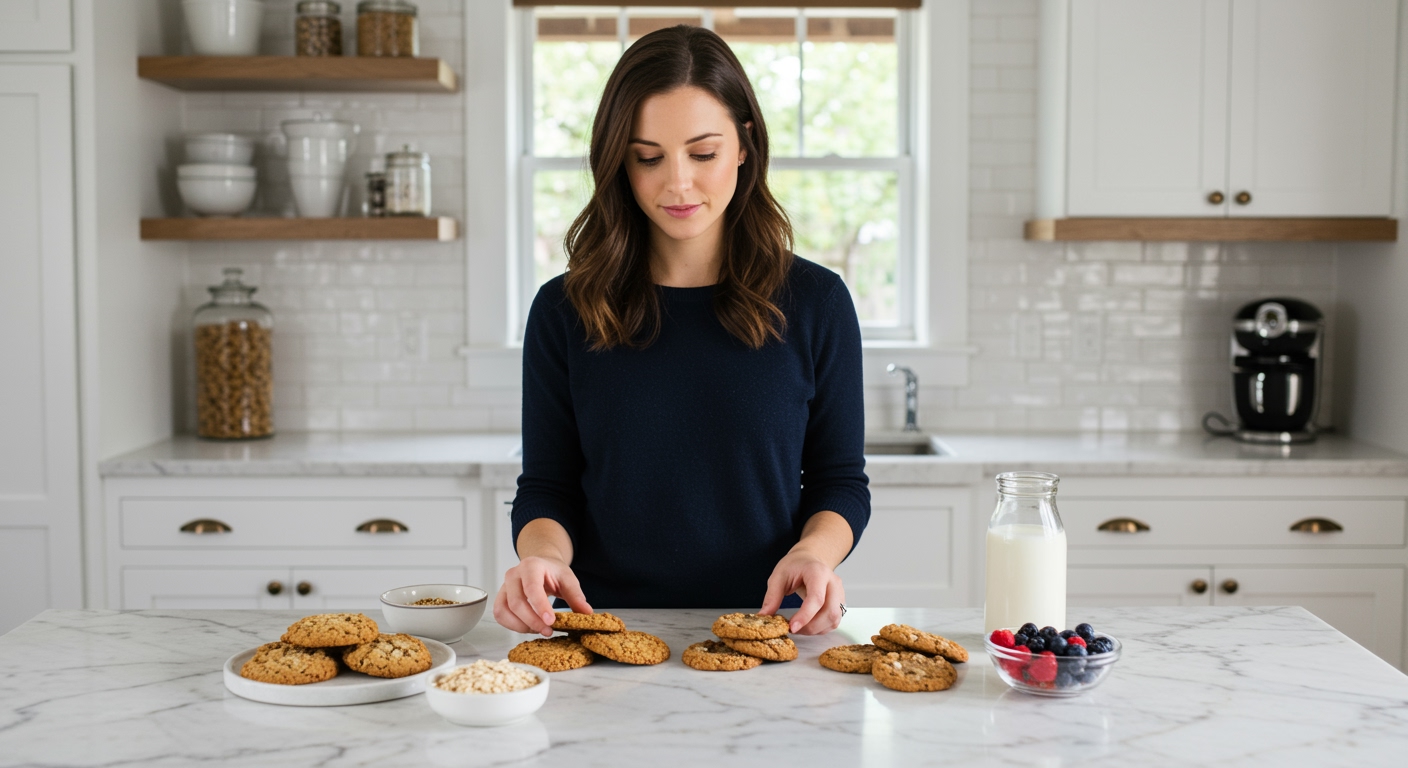✪ Key Takeaway: Cookies are not always bad for PCOS when you choose options with whole grains, healthy fats, and minimal added sugars.
Introduction
You reach for that chocolate chip cookie and immediately feel guilty because someone told you cookies are forbidden with PCOS.
This black-and-white thinking about food creates unnecessary stress and can actually make your PCOS symptoms worse through the cycle of restriction and bingeing.
Hi, I’m Abdur, your nutrition coach and today I’m going to explain how you can enjoy cookies while managing PCOS by making smarter choices that work with your body instead of against it.
What Makes Some Cookies Problematic For PCOS?
Most commercial cookies contain refined flour, which breaks down quickly into glucose and spikes your blood sugar levels.
This rapid blood sugar rise triggers your pancreas to release large amounts of insulin to bring glucose levels back down.
Women with PCOS already struggle with insulin resistance, meaning their cells do not respond properly to insulin signals.
When insulin levels stay elevated, your ovaries produce more androgens like testosterone, which worsens PCOS symptoms.
High sugar content in cookies also feeds inflammation throughout your body, disrupting hormone balance even further.
Trans fats and excessive amounts of omega-6 oils in processed cookies create additional inflammatory responses that interfere with ovulation.
✪ Fact: Studies show that refined carbohydrates can increase insulin levels by up to 300% within two hours of consumption.
Which Cookie Ingredients Actually Support PCOS Management?
Almond flour and coconut flour provide protein and healthy fats that slow down sugar absorption into your bloodstream.
These alternative flours have a much lower glycemic index compared to white flour, preventing those dangerous insulin spikes.
Oats contain beta-glucan fiber, which helps regulate blood sugar levels and improves insulin sensitivity over time.
Nuts and seeds add magnesium and zinc, two minerals that many women with PCOS are deficient in.
Dark chocolate with at least 70% cacao provides antioxidants that reduce inflammation and may improve insulin function.
Natural sweeteners like stevia or monk fruit do not raise blood sugar levels, making them PCOS-friendly alternatives to regular sugar.
✪ Pro Tip: Look for cookies with at least 3 grams of fiber per serving to help stabilize blood sugar levels.
How Can You Make PCOS-Friendly Cookies At Home?
Replace regular flour with a combination of almond flour and coconut flour for better blood sugar control.
Use natural sweeteners like erythritol or stevia, which taste sweet but do not affect your insulin levels.
Add protein powder to your cookie dough to further slow down carbohydrate absorption and keep you satisfied longer.
Include healthy fats from nuts, seeds, or coconut oil to improve the nutritional profile and reduce inflammation.
Incorporate cinnamon, which has been shown to improve insulin sensitivity and help regulate blood sugar naturally.
Keep portion sizes reasonable by making smaller cookies or freezing half the batch for later enjoyment.
✪ Note: Homemade cookies allow you to control every ingredient and avoid hidden sugars and preservatives found in store-bought versions.
When Is The Best Time To Enjoy Cookies With PCOS?
Timing your cookie consumption can make a significant difference in how your body responds to the carbohydrates.
Eating cookies after a workout takes advantage of your muscles being more sensitive to insulin and ready to use glucose for recovery.
Having a small cookie as part of a balanced meal with protein and fiber helps slow down sugar absorption.
Avoid eating cookies on an empty stomach, especially first thing in the morning when cortisol levels are naturally higher.
Late evening consumption can interfere with sleep quality and hormone production, both crucial for PCOS management.
Consider having cookies during your follicular phase when insulin sensitivity tends to be better than during the luteal phase.
✪ Pro Tip: Pair your cookie with a handful of nuts or a piece of cheese to create a more balanced blood sugar response.
What Should You Look For When Buying Store-Bought Cookies?
Always check the ingredient list first, looking for whole grain flours, nuts, and seeds as primary ingredients.
Avoid cookies with high fructose corn syrup, which is particularly problematic for insulin resistance and liver health.
Look for options with less than 10 grams of added sugar per serving to minimize blood sugar spikes.
Choose cookies made with coconut oil or olive oil instead of vegetable oils that promote inflammation.
Seek out brands that use natural preservatives like vitamin E instead of artificial chemicals that can disrupt hormones.
Consider the serving size carefully, as many packages contain multiple servings that can lead to overconsumption.
✪ Fact: Many commercial cookies contain up to 15 different additives and preservatives that can interfere with hormone balance.
The Bottom Line
Cookies are not inherently evil for women with PCOS when you make informed choices about ingredients, timing, and portion sizes.
Food freedom comes from understanding how different foods affect your body, not from following rigid rules that create guilt and stress.
I would love to hear about your experiences with managing sweet cravings while dealing with PCOS, so please share your thoughts and questions in the comments below.
References
At NutritionCrown, we use quality and credible sources to ensure our content is accurate and trustworthy. Below are the sources referenced in writing this article:
- PMC: Dietary Interventions for PCOS
- Nature: Sugar Metabolism and PCOS
- PMC: Insulin Resistance in PCOS
- Mass General Brigham: Nutrition for PCOS





